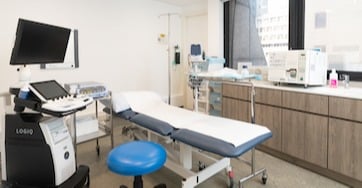The colon, also known as the large intestine, is a crucial part of the digestive system. What you eat and drink, especially with regard to your fibre intake, can have an impact on your overall intestinal and colon health. With many people unaware of the early signs of colon disease, the damage can build up while being unnoticeable until it becomes a much larger problem.
There are many conditions that can affect the colon and most can be treated without surgical intervention. However, there are also a few problems that require immediate medical attention or a colectomy, but what exactly does that involve and how does someone get to that stage?
What is a colectomy?
A colectomy is a colorectal surgery that involves the removal of a part, or even all, of the large intestine. You may get referred to this type of surgery if your large intestine is affected by conditions like cancer, Crohn’s disease, bowel obstructions or diverticulitis.
Removal of the colon is usually necessary in cases where there are cancerous growths or tumours that are spreading quickly. This can also happen in the situations where the colon has experienced so much damage that the chances of it regenerating are low.
Common colon diseases that colectomy is used to treat are as follows:
Colon cancer
When cancer is found in the large intestine, the section infected by cancer might need to be removed before the infection spreads. Cancers that have developed into later stages might need to have the whole tract removed.
Bowel obstruction
A blocked bowel (or intestinal obstruction) may require a portion of the intestine to be removed if the intestine is completely blocked and requires immediate attention.
Diverticulitis
Diverticula are small bulges, pockets or lumps that can develop in the lining of your intestines. When the diverticula become inflamed or infected, causing severe symptoms, it’s called diverticulitis. Severe symptoms include diarrhoea, constipation or rectal bleeding [1]. In some cases, your doctor may recommend a colectomy as a treatment option to remove the affected portion.
Intussusception
This type of intestinal obstruction is common in children under the age of three[2]. It’s a form of blockage that happens organically when one part of the colon slides into another and folds up. This may be treated with a colectomy depending on its severity.
Other reasons why someone might undergo a colectomy are for Crohn’s disease, ulcerative colitis, to control bleeding, or just to prevent colon cancer due to the formation of precancerous colon polyps.
What you can expect during a colectomy
The standard procedure of a colectomy involves removing a part or all of your large intestine to prevent an infection from spreading to the rest of your body, or causing permanent or life-threatening damage. Before the procedure, you will be given the necessary anaesthetic to minimise pain during the procedure.
A colectomy can be performed in two ways: open colectomy or laparoscopic colectomy.
Open colectomy vs laparoscopic colectomy
Open colectomy usually involves opening up the abdomen with a large incision to have access to the colon.
Laparoscopic colectomy is a less painful form of treatment that is done by making small incisions around the abdomen. A camera and some special surgical instruments are then inserted through to perform the surgery. The procedure is monitored on a video screen through the camera, and the excised part is brought out through the small incision.
The way a colectomy is performed depends on the severity of the condition and the discretion of the doctor. There are at least four types of colectomy surgeries. Some of the common types are:
- Total colectomy: the complete removal of the colon
- Partial colectomy: the removal of a part of the colon
- Hemicolectomy: the removal of half of the colon on either side
- Proctocolectomy: the removal of both the colon and the rectum
Colectomy in Hong Kong
Colectomy has been on the rise in Hong Kong due to the prevalence of medical conditions such as colorectal cancer and tumours. According to the Hospital Authority’s statistics in 2017[3], colorectal cancer was among the top five commonly diagnosed cancers in Hong Kong, with 5,635 new cases[4] registered in the year alone. Being the primary treatment for this type of cancer, the use of colectomy in Hong Kong has also increased.
While there may be significant differences in price and waiting time, colectomies are available in both public hospitals and private practices in Hong Kong. A form of referral is usually needed to undergo a colectomy. As it's an invasive procedure, it's important you discuss all your treatment options with your doctor. In some situations, you may have a choice between various colectomy operations or not to undergo them for other treatment options. Your doctor should discuss the benefits and risks of each at length.
Life after a colectomy
As a colectomy involves removing a part of or the whole large intestine, you can imagine life after a colectomy won’t be the same. Although there will be challenges, many people go on to live their normal lives after surgery, enjoying their favourite hobbies like swimming, running, gardening and so on.
Wearing a colostomy bag
Depending on the condition of your intestine and how much of the colon is saved, you may need to wear a colostomy bag (also known as stoma bag or ostomy bag) to collect waste. The colostomy bag is a small waterproof pouch that is attached between the large intestine and the abdominal wall, which can then be emptied. Generally, colostomy bag users will continue to lead a normal life, but there are a few key things that will change in their routine. This includes carrying extra bags, caution to not dislodge the bag and the avoidance of flatulence forming food and drinks.
Stoma
The colostomy bag attaches over the stoma. The stoma is the opening in the abdomen wall from where one end of the colon diverts to. The procedure to create a stoma is called a colostomy, and the stoma can be permanent or temporary depending on why you need one[5]. For example, if there is not enough bowel left to make a complete pathway, the stoma is more likely to be permanent [6].
Consultation with OT&P
The majority of patients receive a colorectal surgery or colectomy to stop the disease from spreading further or causing any life-threatening damage. If you’ve been referred to undergo a colectomy and are not entirely sure about the procedure, you should get a second opinion on the treatment options available.
The most important takeaway from this blog is that you need to keep track of your gastrointestinal health. Get in touch with our GP or check out our general surgery services for more information.
References
1.nhs.uk. 2017. Diverticular Disease And Diverticulitis. [online] Available at: <https://www.nhs.uk/conditions/diverticular-disease-and-diverticulitis> [Accessed 29 September 2020].
2.Stanfordchildrens.org. n.d. Intussusception In Children. [online] Available at: <https://www.stanfordchildrens.org/en/topic/default?id=intussusception-90-P02002> [Accessed 29 September 2020].
3.Chp.gov.hk. 2020. Colorectal Cancer. [online] Available at: <https://www.chp.gov.hk/en/healthtopics/content/25/51.html> [Accessed 28 October 2020].
4.Www3.ha.org.hk. 2017. Colorectal Cancer In 2017. [online] Available at: <https://www3.ha.org.hk/cancereg/pdf/factsheet/2017/colorectum_2017.pdf> [Accessed 29 September 2020].
5. nhs.uk. 2020. Colostomy. [online] Available at: <https://www.nhs.uk/conditions/colostomy/> [Accessed 4 November 2020].
6. Bowel Cancer UK. 2019. Stomas. [online] Available at: <https://www.bowelcanceruk.org.uk/about-bowel-cancer/treatment/surgery/stomas/> [Accessed 4 November 2020].

 Central General Practice
Central General Practice
 Repulse Bay
Repulse Bay
 Clearwater Bay
Clearwater Bay
 BodyWorX Clinic
BodyWorX Clinic
 Central Specialist Clinic
Central Specialist Clinic
 MindWorX Clinic
MindWorX Clinic
 Partner Clinics
Partner Clinics
 Family Clinic
Family Clinic
 OT&P Annerley Midwives Clinic
OT&P Annerley Midwives Clinic
